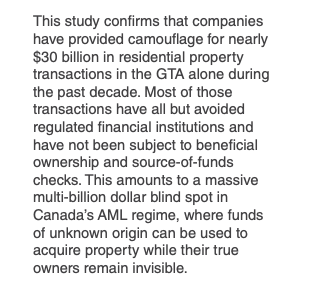
Too few people understand how government debt sends home prices higher.
The more money the government needs, the more bonds the BOC has to purchase.
This drives down rates across the board — from the government’s rate to mortgage rates.
This does two things.
<thread> 🧵 👇
The more money the government needs, the more bonds the BOC has to purchase.
This drives down rates across the board — from the government’s rate to mortgage rates.
This does two things.
<thread> 🧵 👇
2/ One: It makes it cheaper to borrow more money. Traditions economics says this lowers the cost of servicing, but in environments where prices are rising, it just allows them to grow faster.
Traditional analysis does not apply when the state creates a non-market environment.
Traditional analysis does not apply when the state creates a non-market environment.
3/ Two: it lowers fixed income investments, and crowds investors out of the market.
If an institution had a billion to lend to the gov for 2%, and that falls to 1%, they look elsewhere. They don’t want to lose inflation.
Since the gov backs housing, why not try there?
If an institution had a billion to lend to the gov for 2%, and that falls to 1%, they look elsewhere. They don’t want to lose inflation.
Since the gov backs housing, why not try there?
4/ Since housing is essential, applying more pressure to housing stock by investment makes the government pump more money into the market.
Now a government that wants to look good starts handing out subsidies so they can say they did something, but where does the debt come from?
Now a government that wants to look good starts handing out subsidies so they can say they did something, but where does the debt come from?
5/ exactly. It comes from government borrowing, which drives rates lower, and makes more investors seek other types of investment — even more.
Now you have the gov handing you money to build, more capital seeking shelter in housing, and gov giving bigger mortgages.
Now you have the gov handing you money to build, more capital seeking shelter in housing, and gov giving bigger mortgages.
6/ Supplyists argue more housing makes housing cheaper.
It doesn’t. If I’m an investor with more capital to allocate than you can build housing, you’re building my bond substitute.
It’s a human centipede of incompetence. People ignore that an investor’s goal is to make money.
It doesn’t. If I’m an investor with more capital to allocate than you can build housing, you’re building my bond substitute.
It’s a human centipede of incompetence. People ignore that an investor’s goal is to make money.
7/just to clarify, I don't think the gov should cut services or raise taxes to stop with the debt.
They should cut corporate welfare, and stop focusing on housing. Buying a house provides the worst capital velocity, requiring more debt-driven growth.
They should cut corporate welfare, and stop focusing on housing. Buying a house provides the worst capital velocity, requiring more debt-driven growth.
• • •
Missing some Tweet in this thread? You can try to
force a refresh




